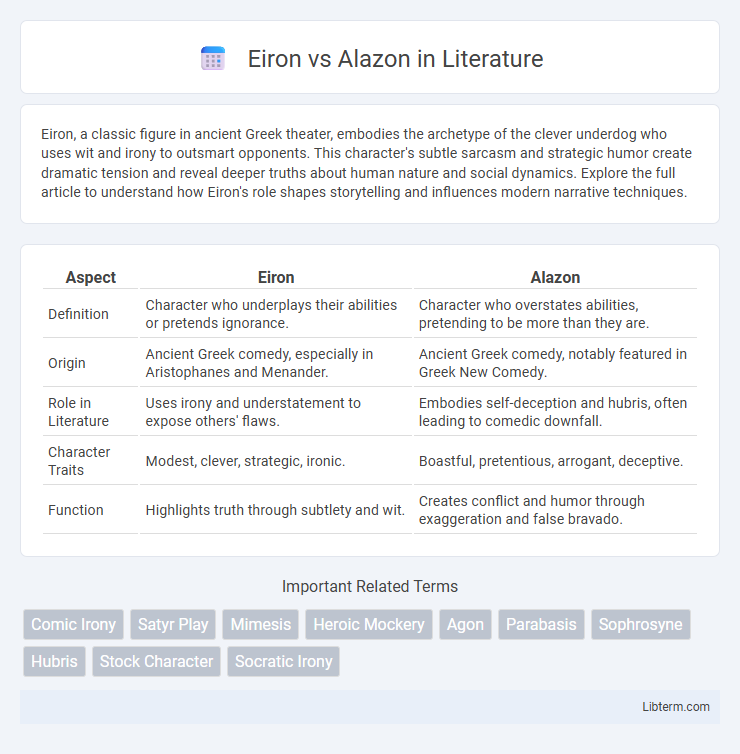Eiron, a classic figure in ancient Greek theater, embodies the archetype of the clever underdog who uses wit and irony to outsmart opponents. This character's subtle sarcasm and strategic humor create dramatic tension and reveal deeper truths about human nature and social dynamics. Explore the full article to understand how Eiron's role shapes storytelling and influences modern narrative techniques.
Table of Comparison
| Aspect | Eiron | Alazon |
|---|---|---|
| Definition | Character who underplays their abilities or pretends ignorance. | Character who overstates abilities, pretending to be more than they are. |
| Origin | Ancient Greek comedy, especially in Aristophanes and Menander. | Ancient Greek comedy, notably featured in Greek New Comedy. |
| Role in Literature | Uses irony and understatement to expose others' flaws. | Embodies self-deception and hubris, often leading to comedic downfall. |
| Character Traits | Modest, clever, strategic, ironic. | Boastful, pretentious, arrogant, deceptive. |
| Function | Highlights truth through subtlety and wit. | Creates conflict and humor through exaggeration and false bravado. |
Introduction to Eiron and Alazon
Eiron and Alazon are classical archetypes originating from ancient Greek comedy, representing contrasting character types. The Eiron is characterized by self-deprecating wit and understated behavior, often masking cleverness beneath modesty. In contrast, the Alazon is a braggart or impostor, marked by arrogance and exaggerated self-importance, serving as a comedic foil to the Eiron's subtlety.
Defining Eiron: The Understated Character
Eiron represents the understated character in classical literature, characterized by modesty and subtlety that conceal inner strength or wit. This figure often uses irony and self-deprecation to challenge arrogance without overt confrontation, contrasting sharply with the brash and boastful Alazon. The Eiron's subtlety serves as a powerful narrative device, revealing truth through understatement and clever irony.
Understanding Alazon: The Boastful Antagonist
The Alazon represents the boastful antagonist in classical literature, characterized by exaggerated self-importance and deceptive arrogance. This figure often contrasts sharply with the Eiron, who uses wit and understatement to expose the Alazon's false bravado. Understanding Alazon helps illuminate themes of hubris and social critique in ancient Greek comedy and modern storytelling.
Historical Roots of Eiron and Alazon in Greek Comedy
The historical roots of Eiron and Alazon trace back to ancient Greek comedy, where Eiron represented the self-deprecating, clever underdog who used wit and understatement to outsmart others, while Alazon embodied the braggart or impostor characterized by hubris and boastfulness. Playwrights such as Aristophanes and Menander frequently employed these contrasting stock characters to critique social norms and human folly through satire and irony. The enduring legacy of Eiron and Alazon highlights the nuanced exploration of human behavior and social dynamics central to classical comedic traditions.
Literary Functions: Eiron vs Alazon
Eiron and Alazon serve contrasting literary functions that enrich character development and thematic depth. The Eiron, embodying self-deprecation and irony, often undermines expectations to reveal deeper truths or critique social norms, while the Alazon represents boastfulness and pretense, driving conflict through exaggerated claims or false superiority. This dynamic interplay heightens dramatic tension and highlights the disparity between appearance and reality in classical and modern literature.
Key Differences Between Eiron and Alazon
Eiron and Alazon represent two contrasting character archetypes in classical comedy, with the Eiron embodying subtle irony, understatement, and self-deprecation to reveal truth, while the Alazon is characterized by boastfulness, arrogance, and inflated self-importance, often masking ignorance. The Eiron's humor derives from cleverness and humility, manipulating perception through understatement, whereas the Alazon's comedy stems from exaggerated pride and foolishness, displaying a lack of self-awareness. This fundamental opposition highlights key thematic dynamics in ancient literature, where the Eiron often exposes the pretensions embodied by the Alazon.
Eiron and Alazon in Modern Narratives
Eiron and Alazon archetypes in modern narratives represent contrasting character traits where Eiron embodies humility, self-deprecation, and subtle wit, often deflating grandiose or pretentious figures symbolized by the Alazon. Contemporary literature and media utilize the Eiron to challenge authority and truth, portraying protagonists who employ irony and understatement to reveal deeper truths beneath surface appearances. This dynamic between Eiron and Alazon enriches storytelling by exposing hypocrisy and facilitating critical reflection on societal norms within modern cultural contexts.
Classic Examples: Eiron and Alazon in Literature
Eiron and Alazon serve as classic archetypes in literature, where the Eiron embodies understatement and self-deprecation to outwit opponents, exemplified by Odysseus in Homer's *Odyssey*. In contrast, the Alazon represents the boastful impostor, often portrayed through characters like the braggart soldier in Aristophanes' plays. These figures illustrate fundamental comedic roles, highlighting human folly and cunning in classical narratives.
Thematic Importance of Eiron-Alazon Dynamic
The Eiron-Alazon dynamic critically explores themes of identity, deception, and self-awareness in literature and theater. The Alazon, representing arrogance and self-delusion, contrasts with the Eiron's subtle irony and understatements, highlighting the tension between appearance and reality. This interplay serves as a thematic device to challenge social norms and provoke reflection on human folly and authenticity.
Conclusion: Lasting Impact on Storytelling
The contrast between Eiron and Alazon archetypes profoundly shapes narrative dynamics and character development, influencing audience perception and engagement. Eiron's subtlety and ironic self-effacement cultivate deeper empathy and invite nuanced interpretations, while Alazon's brash overconfidence drives conflict and comedic tension. Their enduring presence in storytelling underscores a timeless exploration of human folly and wisdom, cementing their significance in literary and dramatic traditions.
Eiron Infographic

 libterm.com
libterm.com